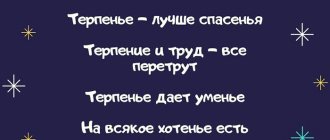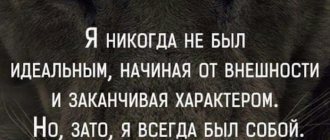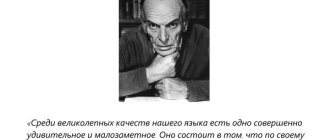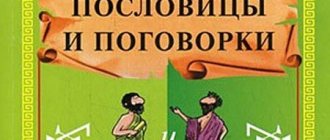Definition
Catchphrases are apt words, figurative expressions, stable expressions that have become known to all native speakers.
This term appeared thanks to Homer, who used the word “winged” in his works, explaining his idea by saying that words seem to fly on wings to the interlocutor.
Winged expressions are figurative in nature and are used in a figurative meaning.
The peculiarity is that each winged word or expression was said by a specific person or taken from a specific source.
Catchphrases have an authorship, which is why they differ from phraseological units and phraseological units, which have an anonymous or folklore origin.
Winged words are often used in oral and written speech as a lexical means of expressiveness. The presence of popular expressions of various types in a person’s speech indicates the speaker’s erudition, broad outlook and extensive knowledge.
Dictionaries of figurative words and expressions; comparison dictionaries
“Dictionary of figurative words and expressions of the folk dialect.” Compiled by O.I. Blinova, S.E. Martynova, E.A. Yurina. (1st edition. Tomsk, 1997. 2nd edition. Tomsk, 2001).
This is the first regional dictionary that describes only figurative linguistic means of folk colloquial speech - actual figurative words and metaphors, comparative phrases and phraseological units characteristic of the speech of Russian old-timers of the Middle Ob region. The selection of material for it was carried out taking into account not the thematic, but the expressive-evaluative criterion. The dictionary contains 2545 lexical and phraseological units.
As figurative linguistic means, the Dictionary includes the following units, marked with appropriate marks: 1) metaphors, linguistic ( YAM
) and speech (
RM
);
2) comparative phrases ( in comparative
), instrumental case forms with the semantics of comparison (
creative comparative
) and similar forms that have become adverbs, 3) personifications (
personification
), 4) words with a bright internal form expressed in morphemic structure - the so-called “actually figurative words” (
SO
), 5) phraseological units that have expression and contain an image that motivates their meaning (they are highlighted with the sign ♦).
Examples of dictionary entries.
CRUST . Affectionate. to the crust
.
Creation
compare _
About a hardened layer of something
.
In spring the crust hardens ( B. Yar
).
SPIT . 1. Braided hair
.
In
comparison
Something shaped like a scythe.
It's black, it's multiplying.
Near the water, she has a long braid on her head, like a braid, from the peasant himself ( B. Yar
).
And frills were spun from wool. Like braids, you will weave them like this... ( Par.
).
2. Usually plural
BRAIDS.
YAM.
Cucumber stems or tendrils on the stems, curly like braids .
Cucumbers have braids that curl like a bindweed ( At.
).
Cucumbers let down their braids. All the tops have already disappeared. Come [they say]: “Cucumbers are putting out tendrils.” And here everyone says “braids” ( Versh
.).
[Cucumbers] send out braids like threads, like hairs ( Kaft
.).
3. YAM. A narrow, spit-like strip of drifted snow
.
The blizzard caused spits and snowdrifts ( B. Pash
.).
Well, a snowstorm in winter carries snow, blows, and still sweeps the braids ( Meadow
).
The snowstorm sweeps the scythes, sweeps the roads ( Meadow
).
♦ BRAID TO SELL (SELL) . One of the rituals of the wedding ceremony: buying back the bride's braid.
Her [the bride's] brother knocks with a rolling pin, and they give a price - they sell the braid.
He takes a lot of money ( Batk
.).
They sold the braid. The braids are loose, the bride is sitting, and the boyfriend is selling the braid, the boyars come to buy the braid ( Aks.
).
CLUBFOOT . RM. Clumsy, awkward.
Lord, there's a clubfoot, there's a clubfoot: I spilled a whole jar!
( N. Isht
.)
COSTER . CO. Expr
.
Strongly scold, scold
.
The guy goes straight out of his hands. Your soul suffers, let him set fire to you ( Tog.
).
They set fire to Ninka in every possible way. He grabbed her and cursed her in every possible way ( Colp.
).
Wed
: kostar
'to separate the fire'.
BONE . CO. Strongly scold, scold, as if “washing bones.”
This is: to bone, and to scold, and to curse (
M. Ant
.).
He bones him, and everything happens there: he scolds him, and shouts ( M. Ant
.).
BONE ♦ BONE BEATS ON BONE . About the state of severe exhaustion
.
They fasted - and they fasted, so the bones are bones, bone beats against bone ( Baig
.).
IT'S TIME TO PUT THE BONES IN PLACE . It's time to die
.
He kept saying: “I want to die in the summer.” Of course, it’s time to put the bones in place ( Kolp
.).
KATCH ♦ TAKE THE WHOLE KATCH ON YOURSELF . Take care of someone or something.
At the age of fifteen, my father died, and I took over the entire knapsack: we had such a ladder (
B. Yar
).
STOKER . A worker servicing the furnaces of steam boilers. In comparison
.
About someone doing heavy physical labor.
And in the summer, like a stoker.
My hands hurt a lot, the pain was unbearable ( B. Yar
).
ESTATE . YAM
.
Olits.
Variety, species, variety (of animals, plants). The snake, the frog and the lizard are all one class
(Carb.)
They sent wheat to every class
(Khald.)
TO BE SAVED . RM. Olits. It’s good to preserve, as if getting rid of something. misfortunes.
The currants were saved as if they were fresh, not a speck of mold, nothing left
(Step.)
“An idiolect dictionary of comparisons of a Siberian old-timer.” E.V. Ivantsova. Tomsk, 2005.
This is the first dictionary of comparisons presented in the speech of one dialect speaker. Until recently, comparisons were not the subject of a separate description in Russian lexicography; they were partially reflected in explanatory and phraseological dictionaries. However, in recent years the situation has changed. Interest in comparisons is caused by their widespread use in speech and their special significance in language. Comparative units are a valuable source for studying the linguistic picture of the world, stereotypes and standards of national culture.
The purpose of the dictionary is a systematic description of comparisons in the speech of Vera Prokofievna Vershinina (1909-2004), which has already been discussed (see p. 000). The volume of texts recorded from her is more than 10 thousand pages.
The dictionary includes both single and regular comparisons in the informant’s speech. The Dictionary describes 1744 comparisons (2599 uses). It includes all-Russian comparatives ( like a stone
– 'about smth.
very hard'), dialectal ( like karym
- 'about an important, significant person') and dialect variants of all-Russian (
like kulubok
- 'about a small and fat animal', cf. tangle). In formal terms, the Dictionary reflects various speech modifications of the comparative phrase, which consists of three semantic and three structural elements (what is being compared, what is being compared with, the basis of comparison and the means of communication). In the preface to the Dictionary, the author provides a detailed classification of the material taking into account various parameters and notes what types of comparisons are included in the Dictionary corpus.
The title of a dictionary entry is a significant word that is part of a comparative phrase. A comparison for ease of searching is considered in the article with the headword closest to the beginning of the alphabet. (For example, comparison as the wind rages
given in the article
to rage , other components of comparisons in the dictionary are given with references: the wind like the wind rages
see
rage ).
One dictionary entry includes all comparative phrases containing the heading word. At the same time, variants of the comparative phrase are reflected, and sometimes its lexical compatibility is noted. The Dictionary widely uses various marks that reflect the peculiarities of the use of phrases and the aesthetic assessment contained in them. Examples of dictionary entries.
AGANKA (relative). ● looks like Aganka. About a person similar to OS in appearance
. And this one, and that one is slender, even though he’s big, and the slender one is good. He looks like Aganka, huh? Or not?
BATH ● as in a bathhouse they put it on a stove. About large stones with a rough surface
. First they will pour water, boiling water, and put a stone there - these are the stones, these are the stones, rough stones, special, like they put on a heater in a bathhouse.
● as from/after a bath. About a person who is sweating a lot
. And I, too, was crazy there, sweating... It’s hot there, and there’s still gas (in the kitchen). Looks like it's dried out. Everything looked like it came from a bathhouse. That's fat there!; And then he began to chop, so he split several thin lumps, sat down on a stone: “Like after a bath,” gyt. Covered in sweat.
2
.
● like in a bathhouse. 1. About the feeling of excessive heat
. I would take it off, Gutya! True, it’s like sitting in a bathhouse, sweating in your clothes.
2. In the Czech Republic. About a room with a lot of steam
. There will be a lot of steam there (from the stove on on the veranda in winter). Gena that time: “Oh, what a steam, like in a bathhouse.”
● in a bathhouse style, adv. In Prec. Just as typical for a bathhouse
.
And the second one (husband) died, she was still leaving to get married. Don’t look that she’s covered like a bathhouse (she was a bad housewife)! She left to get married. 2.
TANNED ● like tanned. Disapproved About hardened baked goods that have lost their softness
. She apparently regretted putting butter (in the dough) - I pour a lot! She put it in the oven and began to bake (the pies) - they just sit there, like they were tanned there. There is no fat in them.
RIDE ● drove like hell. Joking-iron. About a very dirty stove.
And in the hut... the stove is dirty, dirty, like the devil drove it, probably some kind of tractor driver.
SHULYUKAN. Mummer
.
● like a prankster. Joking-iron.
About a man dressed in old, worn clothes. I put on my shulyukan and walk around. (What is “shulyukan”?) And shulyukans dress up for Christmastide, they dress up for New Year, shulyukans.
List of encountered abbreviations.
OS – object of comparison
CR - someone else's speech
In Prec. – in a precedent text (proverb, saying)
The number after the quotations indicates the number of uses of the comparison.
Subject dictionaries
Just as various aspect dictionaries are created on the basis of the complete Vershinin dictionary, different thematic dictionaries are compiled on the basis of other dialect dictionaries - differential dictionaries. For example, in parallel with the regional “Dictionary of Oryol dialects”, a number of author’s thematic dictionaries are published, built on common principles and collectively recreating different fragments of the linguistic picture of the world in Oryol dialects - “Dictionary of wedding vocabulary of the Oryol region” (M.V. Kostromicheva. Orel, 1998) , “Dictionary of meteorological vocabulary of Oryol dialects” (O. A. Makusheva. Orel, 1997).
The range of new types of dialect dictionaries is expanding. In 1971, a small dictionary “Evaluative substantive and adjective names of persons in the dialect of the village of Kabansk of the Buryat Autonomous Soviet Socialist Republic” was published in Irkutsk by Yu.I. Kashevskaya, in 1986 a “Systemic Dictionary of Subject-Based Vocabulary of the dialects of the Talitsky District of the Sverdlovsk Region” was published, and in 1998 in “Dictionary of dialect verbs of the Tambov region” by L.S. Moiseeva was published in Tambov.
Dictionary of meteorological vocabulary of Oryol dialects . Makusheva O.A. (Eagle, 1997)
The dictionary is the first attempt at a lexicographic description of the names of natural phenomena. The vocabulary of natural phenomena is a relic layer of the lexical fund (and not only of Oryol dialects). Meteorological vocabulary is regular, stable, stable due to extralinguistic factors, and differs from other thematic groups in the least openness and permeability. The value of meteorological vocabulary is determined by its belonging to the main vocabulary of the language. Dialectal meteonyms, shown in the dictionary against the background of original contexts, can provide important ethnographic information, information about the life and worldview of dialect speakers, their past and present.
The dictionary was created on the basis of the rich card index of the “Dictionary of Oryol dialects”, which contains more than 1.5 million cards, based on the author’s records and Oryol materials from the “Lexical Atlas of Russian Folk Dialects”.
The thematic approach allows us to distinguish three groups of words and phraseological units: the state of the atmosphere, the movement of air in the atmosphere, water in the atmosphere. In each group, subgroups are distinguished, within which words realize different shades of meaning. Thus, in the “state of the atmosphere” group there is a subgroup “thermal state of the atmosphere” (with words naming warm and cold weather) and a subgroup “state of the atmosphere by the presence or absence of meteorological elements (cloudiness, precipitation, wind).” Words within each subgroup are given in alphabetical order. The dictionary contains nouns, adjectives, verbs and words of the state category (with the mark “in the meaning of a tale”). The design and content of a dictionary entry is traditional. The appendix contains 7 maps reflecting the distribution of individual meteonym words on the territory of the Oryol region, a diagram of the wind rose of the Oryol region with dialect names, and an index of meteonym words. In total, the dictionary describes about 400 units.
Examples of dictionary entries.
STATE OF THE ATMOSPHERE.
1. Thermal state of the atmosphere.
BANYA , and, w. Hot, sultry, steamy air; stuffiness
.
The bathhouse and the streets stay the whole day, only to fall down to the thing. Bolkh.
Borovoe .
The bathhouse is hot and stuffy, like a bathhouse. Bathhouse after dazhzhey buvait, kada steam from the earth to go. I know.
Lokno. The bathhouse is stuffy.
Dmitry
Bald .
At the bathhouse I can’t breathe, languor. Template
Navlya +
Trosn.
Somovo, Tureika, Yakovlevo; Uritsk. Sunrise, Lukino, Yushchino .
WOLF: ◊ At least (at least, at least) drive (drive) the wolves. About weather with low air temperatures; extreme cold, frost
.
Your face is cool, even if you kill the rolls. Bolkh.
Black mud + Bolkh. Velishinskaya .
I used to sit at home, and behind the window there was a chicken, idly, well, shady windrows. Eagle
Dmitrovka + Orel. Maloe Rakitnoye .
Wow, freeze, fuck the rolls. Uritsk.
Winch .
Whenever it's too cool, they'll say: fuck off the rolls. Uritsk.
Winch .
Whenever it's too cool, they'll say: fuck off the rolls. Hot.
Bugrovo + Hot. Frost .
GREVNY , oh, oh. Warm (about the weather)
.
It's a bad day, you can drip. Bolkh.
Alexandrovka. Grevnya pagodas - it’s warm, encore the hats are coming.
Kolpn.
Logachevka .
It’s a warm day, I’m sitting on the benches. Kolpn.
Ekaterinivka + Laid. Shkava; Kolpn. Spasskoye. COLD , owl., non-perekh.; without Become colder; get colder
.
We drove around a bit, but it cooled down a little. Novos.
Stakhovka .
Sivodni has cooled down, it’s winter. Eagle
Lavrovo .
Studying both cooled down and kept up. Cover
Izvekovo + Novos. Novosil, Khokhly. ZNOBKO , meaning. tale Cold, frosty
.
Znopk today. Cover
Veprinets .
Znopk, put on your hat. Hot.
Znamenskoye .
Whenever there is a sign, the streets are not pakrutissi. Template
Ozerki + Template Rzhavets, Khotkovo .
Thematic dictionaries, unlike regional dictionaries of the same territories, can be complete. These include
Kinds
Winged expressions are divided into:
- titles of works;
- names of heroes of artistic, journalistic, folklore, mythological works;
- actual statements - sayings of famous personalities, quotes.
According to their use, popular words and expressions are divided into those that have already been tested by time (for example, from classical works of art, ancient mythology, etc.), and those that are used at a certain time (connection with advertising, television programs, modern films ).
What have we learned?
Catchphrases are apt words, figurative expressions, stable expressions that have become known to all native speakers. The sources of popular expressions include mythology, fiction, journalistic literature, songs, films, theatrical performances, and statements of famous personalities. Catchphrases are divided into titles of works; names of heroes; actual statements - sayings of famous personalities, quotes. Winged expressions are figurative in nature and are used in a figurative meaning. Winged words are often used in oral and written speech as a lexical means of expressiveness; they indicate the speaker’s erudition, broad outlook and extensive knowledge.
Folk expressions
You should learn to understand figurative expression. For a better and deeper understanding, some of them should be examined.
- For example, hanging your nose. In other words, you can say “to be sad, to be sad.”
- Or drive a wedge. This expression can be interpreted as “to deliberately quarrel, create a quarrel between someone.”
- Speak hand in hand. That is, interfere with doing something or prevent you from concentrating.
- Or - give free rein to your tongue. In other words, talk a lot, speak out, tell something painful or, conversely, give away secrets and secrets.
- Give me a light. You can say: shout, punish, point out shortcomings.
- Look for the wind in the field. This means the following: irretrievable loss of something or someone with a hopeless outcome.
- Let’s look at the expression “break into pieces.” You can understand this statement as follows: try very hard to do something.
- For example, this expression: hand in hand. This expression is usually used to describe a happy married couple. They go hand in hand through life.







